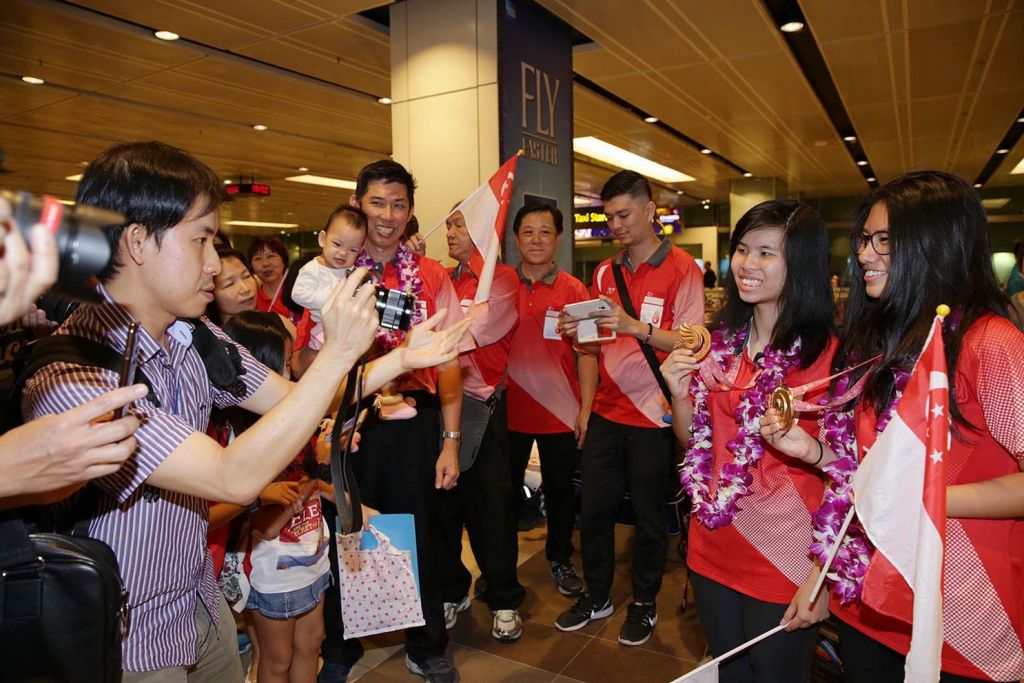
SINGAPORE — Growing up, 18-year-old Adelia Naomi Yokoyama — who was born deaf — looked up to her two older sisters.
Elisa Yukie, now 20, went on to become the Optimist sailing world champion in 2012 and Natasha, 22, is a former national sailor.
But fears over Naomi being too far from safety at sea, as well as her cochlear implant, which cannot be exposed to water, meant that she could not follow in their footsteps.
However, she discovered bowling in primary school and soon fell in love with the atmosphere at the alley and even “the sound of bowling pins”.
Last Saturday, Naomi was part of a duo that achieved a historic feat for Singapore and its deaf community.
She and 17-year-old Kimberly Quek clinched two medals in bowling at the 2017 Deaflympics held in Samsun, Turkey — the first since the Republic began participating in the Deaflympics in 2001.
They beat powerhouses South Korea and Russia in the Women’s Master event, with Naomi clinching gold and Kimberly, the bronze.
It was Naomi’s first outing on the international stage and her mother, Madam Sharifah Masturah Shahab, 51, said the family knew “it was going to be really tough”.
“My husband was (telling me about how) she beat Russia, and a few hours later she beat Korea … Slowly, she was climbing,” said Mdm Sharifah, a special-needs teacher at Rainbow Centre who had been busy with a community event that day.
It was dinnertime in Singapore when the last few rounds of the contest rolled around.
Glued to a live Facebook stream of the match, the family kept on “screaming” in a quiet Thai restaurant in Siglap, then decided to watch the finals in the car. “Our hearts stopped many times,” said Mdm Sharifah.
Naomi found herself surprisingly calm in the face of pressure, going on to defeat women’s all-events champion Kim Jieun in the finals by 230 to 169 pinfalls.
“It was really intense and tough, but I’m glad I did it,” she said.
The girls’ wins propelled Singapore to 30th place out of 97 countries in the overall medal tally of this year’s Deaflympics, which ended on Sunday.
The contingent of the five bowlers and four officials were all smiles when they arrived at Changi Airport Terminal 1 on Wednesday evening.
A modest but enthusiastic crowd of family, friends and representatives from the Singapore Association for the Deaf, Singapore Deaf Youth Section, Singapore Sports School and Singapore Disability Sports Council showed up wearing red, with Madam Sharifah leading them in chants and songs.
Madam Tham Meng Chee, 46, said her daughter Kimberly had felt down after not being able to clinch a medal in the other categories such as the women’s singles and doubles.
Her husband, Mr Jonathan Quek, 47, had tagged along on the trip to Turkey, posting WhatsApp updates on Kimberly’s progress.
When she heard about the medal, Madam Tham “teared up”.
“All we were hoping for her was to gain the exposure and experience, because we knew she was up against many countries … We’re really proud of her achievements,” she said.
“When she was born with this condition, our world was falling apart, we didn’t think there was any future … But we had a lot of help and we’re thankful for all the opportunities for her.”
Kimberly set a personal record of 1,269 pinfalls in her best game, making history among Singapore’s deaf bowlers.
Ministry of Culture, Community and Youth Parliamentary Secretary Baey Yam Keng, who was also at the airport, dubbed the duo the new “golden girls of Singapore”.
The TODAY Enable Fund, set up to support the aspirations of the special-needs community, contributed S$3,000 for the association’s trip to the Deaflympics.
Chef de mission and Deaf Sports Association (Singapore) president Loh Eng Meng said the team was supposed to fly back on July 27, but decided to extend their stay as he felt the girls had the potential to qualify as the top 24 to enter the Women’s Master event.
After some much-needed rest and a celebratory barbeque this Sunday, Naomi and Kimberly will be gunning for their next challenges, which include the first-ever Asean Deaf Games in Bangkok next year and the Asia Pacific Deaf Games in 2019.
Mr Loh hopes to send more deaf athletes to these events, competing across more categories. He added: “We had secretly hoped for one of them to bring back Singapore’s first Deaflympics medal, but for both of them to win and to see our flag being raised for the first time at this major games … the feeling is indescribable.”